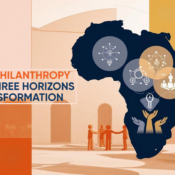Last December in Geneva, G20 countries and other members of the Global Partnership for Effective Development Co-operation (GPEDC) committed to supporting locally owned and locally-led development co-operation and to improving the enabling environment for civil society. Participating as a member of the delegation from civil society and philanthropy, I welcomed these commitments and I’m keen to do what I can to help translate them into practice.
This move toward localisation is long in the making, affirmed at seven effectiveness Summits, the first in 2003 in Rome, and embraced in various United Nations initiatives including the 2030 Agenda and, more recently, by the OECD Development Assistance Committee and the US Agency for International Development (USAID). At the Geneva Summit, USAID pledged to “work to channel high-quality funding as directly as possible to local actors”. They also pledged to advocate for locally-led development and to engage consistently with civil society and local actors. Seventeen other bilateral development partners endorsed USAID’s pledge.
So, what is happening with localisation locally? Even before the Geneva Summit, I started conducting an admittedly very unscientific survey: whenever I meet with an African civil society organisation (CSO), I ask them if they know about localisation. They almost never do. Of course, it takes time for development partners to recalibrate their processes, but more needs to be done to get the word out to CSOs at the country level. In addition, it is not just about information, it is about consultation – making good on the good intention to engage local actors.
How might development partners better engage African CSOs? One potentially powerful avenue is via national networks such as the Nigeria National NGO Network and the Uganda National NGO Forum, as well as via well-rooted regional networks such as REPAOC, the Dakar-based network of West and Central African NGOs. Groups such as these have helped us at EPIC-Africa to connect with thousands of CSOs to conduct pan-African research. Development partners looking to localise could reach out through these networks to consult with CSOs as to how they think they should be engaged.
The Case For Funding Infrastructure
The Geneva Summit was right to affirm the need to improve the enabling environment for civil society. In Africa, as elsewhere, this will require that development partners fund groups that support civil society. This kind of infrastructure involves various types of institutions that provide a range of services to funders and CSOs. It is well established in other regions, especially Europe and North America, but it is just taking hold on our continent. Below, I briefly discuss some of this work and why development partners should support it.
First, development partners that are used to funding intermediaries and international groups such as international NGOs now need sources of reliable data on local CSOs: who is where, what issues they work on, and their impact. At the same time, if CSOs are to get the funding they need for their vital work, they need to be more visible, and more easily found by development partners. CSOs also need ways to connect with each other, build their capacity and skills, and get the information they need to be effective. My organisation’s new African CSO Platform offers funders a gateway to information about CSOs across the continent as well as access to best practices and more. Another example is KujaLink, which aims to connect CSOs with funders.
Second, there is a need for data and knowledge on the African CSO sector. For example, the lack of understanding of the sector’s important contribution to national economies is in part behind the lack of an enabling legal and regulatory environment for civil society in many African countries. Support is needed for independent organisations and university-affiliated institutions that conduct research and produce knowledge on the sector, as well as groups that can help policymakers develop appropriate legal frameworks.
These are just some examples of infrastructure support organisations. Others include firms that provide professional services to CSOs and funders as well as specialised media (Devex is an example from North America).
Funding local groups for collaboration and partnerships
Infrastructure support might also include groups that can help funders find new ways of working. There is a danger that development partners, in localising their funding, will end up channeling funds only to large organisations that can absorb big grants. This would be a mistake. Our research shows that many of the most effective groups operate on a small budget. Their collective impact, however, can be huge. The challenge is to innovate new mechanisms for funding local groups in a way that encourages collaboration and partnerships. An example of this collaborative work is the Regional Education and Learning Initiative in East Africa.
In a world facing urgent issues, funding infrastructure support can seem less pressing. However, as I argued in a recent article, scaling and sustaining the critical development work of CSOs requires that we ensure strong and effective local organisations – and that the sector as a whole becomes more visible and influential in shaping development on the continent.
This article was originally published by the Global Partnership for Effective Development Co-operation (GPEDC).



